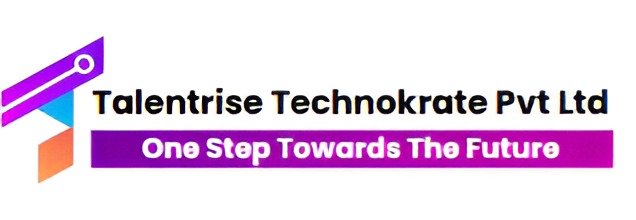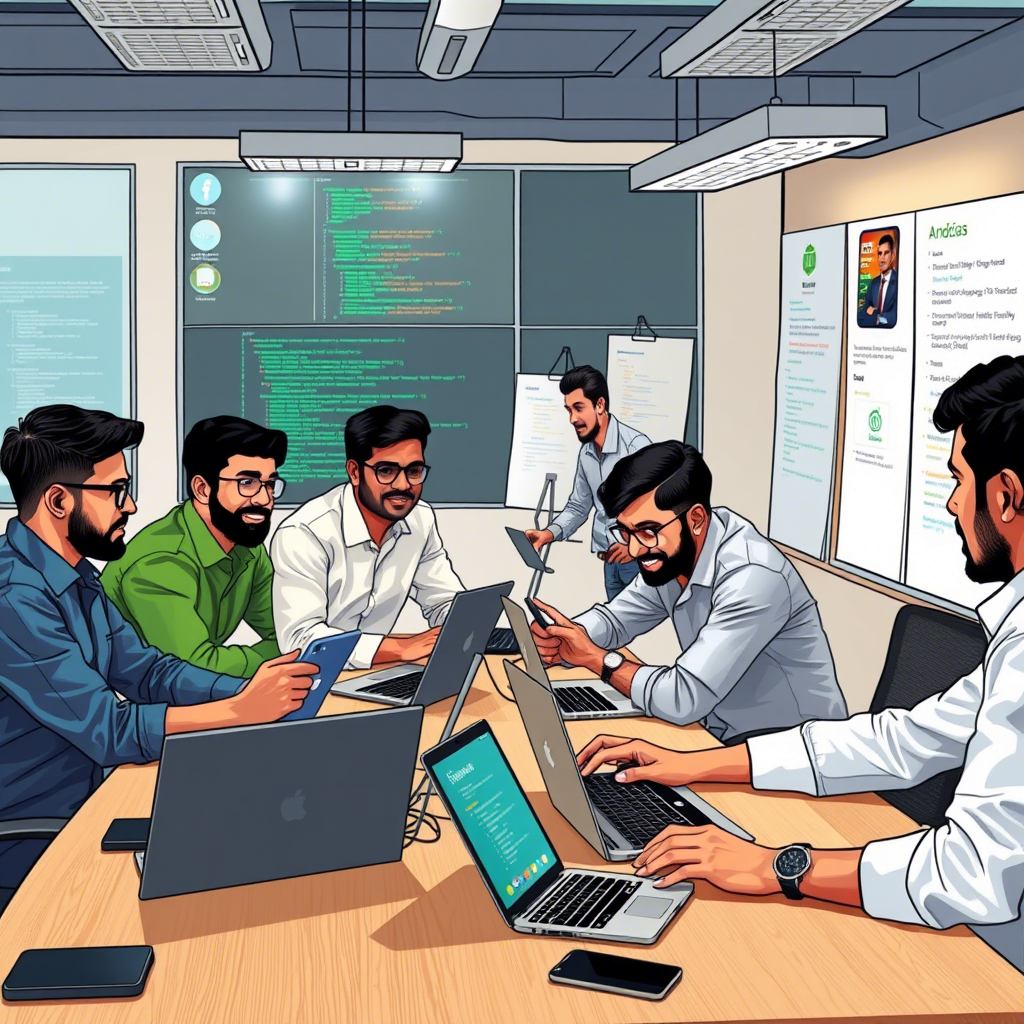Introduction Offshore software development has revolutionized the way companies in the USA access top-tier tech talent, reduce costs, and boost efficiency. At Talentrise Technokrate Pvt Ltd, we offer reliable and scalable offshore development services tailored to business needs across industries. With a dedicated team of experienced developers, we deliver high-quality, innovative, and cost-effective software solutions. Software Development Services Our core offshore services include: Development Process We follow a transparent and agile offshore development methodology: Technologies We Use Our offshore development teams are proficient in: People Also Search For Conclusion Partnering with Talentrise Technokrate Pvt Ltd for offshore software development in the USA means getting access to a skilled team, robust technology, and cost-efficient processes. Whether you’re a startup or an enterprise, our offshore model is tailored to deliver innovation, speed, and quality.
Top Software Development Company USA
Introduction In today’s fast-paced digital landscape, businesses need agile, scalable, and modern software to stay ahead. Whether you’re a U.S.-based startup or a Maharashtra-based enterprise, finding the right development partner is key. Talentrise Technokrate Pvt Ltd is recognized as a top software development company in the USA and a leader in Flutter app development in Maharashtra, offering powerful digital solutions worldwide. Software Development Services Talentrise Technokrate delivers a complete range of software development services: Our Flutter team in Maharashtra builds high-performance cross-platform apps tailored to client goals across the USA and India. Development Process We follow an agile, transparent process ensuring timely and quality deliverables: Every project is guided by business goals and optimized for performance, user experience, and future scalability. Technologies We Use At Talentrise Technokrate, we blend modern tools and proven frameworks: Our Flutter developers in Maharashtra build cross-platform apps using a single codebase—efficient, fast, and scalable. People Search Conclusion If you’re looking for the top software development company in the USA or seeking reliable Flutter app development in Maharashtra, Talentrise Technokrate Pvt Ltd is your ideal partner. With a strong presence in India and global delivery capabilities, we bring scalable, cost-effective, and innovative digital solutions to startups and enterprises worldwide.
Mobile Application Development Services India
Introduction India has emerged as a global hub for mobile application development, offering cutting-edge solutions at cost-effective rates. With a massive pool of talented developers and a thriving IT ecosystem, Indian mobile app development companies deliver innovative, user-centric applications across iOS, Android, and cross-platform frameworks. Whether you’re a startup aiming to disrupt the market or an enterprise looking to digitize operations, India provides the ideal blend of technical expertise, scalability, and affordability. Why Choose Mobile App Development Services in India? Key Services Offered Industries Served Benefits for Global Clients FAQs 1. Why is India a popular destination for mobile app development?India offers a combination of technical expertise, cost efficiency, and high-quality development. 2. What types of mobile apps can Indian developers build?Indian developers build custom apps for iOS, Android, and cross-platform needs across all industries. 3. Is communication a challenge when outsourcing to India?No. Most firms offer 24/7 support, fluent English communication, and real-time collaboration tools. 4. How secure is my app idea with Indian developers?Trusted companies in India sign NDAs and follow strict IP protection protocols. 5. What is the average cost of mobile app development in India?It depends on complexity, but typically ranges from $5,000 to $50,000—significantly lower than US/Europe. Conclusion India continues to be a top destination for mobile app development due to its innovation, skilled workforce, and affordability. By choosing a reliable Indian app development company, businesses can accelerate their digital transformation, reduce time-to-market, and launch high-performance mobile solutions that drive growth.
E-Commerce Mobile App Developers India
Introduction E-Commerce mobile app developers in India are transforming the way businesses sell online by building powerful, user-friendly, and scalable mobile apps. With a strong reputation for innovation, affordability, and technical expertise, Indian developers are helping startups and enterprises alike tap into the booming mobile commerce market. Whether you’re launching a new online store or optimizing an existing one, partnering with the right development team in India can give your e-commerce business a competitive edge. Why Choose E-Commerce Mobile App Developers in India? Top Features to Include in an E-Commerce App Technologies Used by Leading Indian Developers Top Indian Companies for E-Commerce App Development How to Choose the Right E-Commerce App Developer in India 1.Ensure they understand your business model 2.Check portfolio and past projects 3.Read client reviews and testimonials 4.Ask about post-launch support and maintenance 5.Evaluate their tech stack and development process FAQs Q1: How much does it cost to develop an e-commerce app in India?Costs typically range between $5,000 to $50,000 depending on app complexity and features. Q2: Which is the best platform for e-commerce app development?Flutter and React Native are top choices for cross-platform apps, while native Android/iOS may suit platform-specific needs. Q3: How long does it take to build a mobile e-commerce app?A basic app may take 2–3 months, while complex apps can take 4–6 months or more. Q4: Do Indian developers offer post-launch support?Yes, most reputed companies offer ongoing maintenance, bug fixes, and updates after launch. Conclusion Hiring e-commerce mobile app developers in India can be a game-changer for your online business. With the right team, you can build a powerful, feature-rich app that enhances user experience, increases conversions, and scales with your business.
On-Demand Mobile App Development India
Introduction India is a leading destination for on-demand mobile app development, offering scalable, high-performance, and cost-effective solutions tailored to various industries. Indian companies specialize in building apps for taxi services, food delivery, healthcare, logistics, home services, and more. By leveraging modern technologies and agile development processes, these developers deliver intuitive, real-time apps that meet evolving consumer demands and business goals. Why Choose On-Demand Mobile App Development in India? Real-Time FunctionalityIndian developers build responsive apps with real-time tracking, notifications, and updates. Cost-Effective DevelopmentCompetitive pricing with high-quality results makes India ideal for startups and enterprises alike. Skilled DevelopersA vast pool of skilled mobile developers with expertise in Flutter, React Native, Kotlin, and Swift. Scalability and FlexibilityApps are built to handle growing user demands and can easily scale with business growth. Rapid Development CyclesAgile and DevOps methodologies ensure faster time-to-market. Key On-Demand App Solutions in India Taxi Booking AppsReal-time ride tracking, driver ratings, fare calculators, and secure payments. Food Delivery AppsComplete platforms with restaurant listings, order tracking, and delivery partner dashboards. Healthcare & Telemedicine AppsOn-demand doctor consultation, appointment booking, and online prescription management. Grocery & Essentials Delivery AppsInventory management, live order tracking, and contactless payment integration. Home Service AppsBook plumbers, electricians, or cleaners via user-friendly interfaces and geo-location features. Logistics & Courier AppsFleet tracking, route optimization, and delivery notifications in real-time. E-Learning PlatformsOn-demand classes, live tutoring sessions, and student-teacher chat functionalities. Beauty & Wellness Booking AppsBook salon services, spa appointments, and in-home beauty professionals. Top Technologies Used by Indian On-Demand App Developers Top On-Demand Mobile App Development Companies in India 1. Talentrise Technokrate Pvt. Ltd. 2. Hyperlink InfoSystem 3. Appinventiv 4. Softwave Technify 5. Technokrate 6. Ryne Info Tech FAQs Why choose on-demand app development in India?India offers cost-effective, scalable, and fast on-demand solutions across various sectors. Are Indian companies experienced with real-time app features?Yes, features like GPS tracking, push notifications, and live updates are standard. What industries can benefit from on-demand apps?Transport, food, healthcare, e-learning, home services, and logistics, among others. Can Indian developers integrate secure payments?Yes, they offer integrations with Razorpay, Paytm, Stripe, and UPI. Do Indian companies offer post-launch support?Yes, most provide app maintenance, updates, and technical support. Can I get a cross-platform on-demand app in India?Yes, using Flutter or React Native for Android and iOS compatibility. Are on-demand apps developed in India GDPR-compliant?Yes, developers adhere to international data security and compliance standards Conclusion India is a top destination for on-demand mobile app development, offering affordable, scalable, and feature-rich applications that power modern businesses. Whether you’re launching a taxi service, delivery app, or telemedicine platform, Indian developers provide end-to-end solutions that help you succeed in the competitive on-demand economy. Companies like Talentrise Technokrate lead the charge in delivering high-quality, robust, and user-centric mobile apps that fuel digital transformation.
Mobile App Development for Startups India
1. Introduction: India as a Mobile App Startup Hub India has emerged as a global hotspot for mobile app innovation. With a rapidly growing digital ecosystem, affordable development costs, and a vast talent pool, it is no surprise that many startups are choosing mobile app development companies in India to bring their ideas to life. Whether you’re launching a food delivery app, fitness tracker, e-commerce platform, fintech solution, or social networking tool—India offers the technical expertise and scalability startups need. Why Startups in India Need Mobile Apps Mobile apps are no longer a luxury—they’re essential. Here’s why: Software Development Services for Startups in India A professional mobile app development company for startups in India offers a comprehensive suite of services to support every stage of your startup journey: i. Mobile App Development Services ii. Web Development Services iii. MVP Development Services iv. UI/UX Design v. Quality Assurance (QA) & Testing vi. Post-Launch Support Mobile App Development Process for Startups Every startup needs a structured development process to ensure success. Here’s a typical workflow: 1. Discovery Phase 2. Wireframing & Prototyping 3. UI/UX Design 4. Agile Development 5. Testing & QA 6. Deployment 7. Post-Launch Technologies Used in Startup App Development Choosing the right tech stack is crucial. Here are commonly used mobile app development technologies in India: Frontend (Mobile) Backend Database DevOps & Cloud APIs & Integrations Analytics & Performance Benefits of Hiring Indian Mobile App Developers Mobile App Development for Startups by Industry How to Choose the Right Mobile App Development Company in India Frequently Asked Questions (FAQs) 1. How much does it cost to build a mobile app for a startup in India? Cost varies by features and platform but typically ranges from ₹3,00,000 to ₹15,00,000. 2. How long does it take to develop a startup mobile app? From idea to launch: 2–6 months depending on complexity. 3. Which is better for startups—iOS or Android? Android has a wider reach in India, but cross-platform is often the best choice. 4. Can I build an MVP first? Yes, MVP development helps validate your idea affordably. 5. Do Indian developers offer post-launch support? Yes, most companies offer AMC and continuous support. 6. What is the best framework for startup apps? Flutter and React Native for cross-platform apps. 7. Is my app idea safe with an Indian developer? Yes, with an NDA (Non-Disclosure Agreement) in place. 8. What is the difference between hybrid and native apps? Native apps offer better performance; hybrid apps are cost-effective. 9. Can I monetize my app? Yes—via ads, subscriptions, or in-app purchases. 10. What if I need changes after the launch? Most agencies offer scalable updates and maintenance plans. 11. Do I need a website with my mobile app? Yes, for marketing, SEO, and dashboard admin. 12. Is SEO important for mobile apps? Yes—especially app store optimization (ASO). 13. Can startups integrate payment gateways in apps? Yes—Razorpay, Stripe, Paytm, and UPI are common. 14. How secure will my app be? With SSL, encrypted databases, and secure APIs—very secure. 15. Will I get access to the source code? Yes, reputable companies transfer IP and code post-payment. 16. Can I get a prototype first? Yes, most agencies create wireframes and clickable prototypes. 17. Do Indian agencies follow Agile? Yes, many follow Agile or Scrum methodologies. 18. Can I integrate third-party APIs? Yes—like social login, maps, SMS, and analytics. 19. What about user authentication? Firebase Auth, OAuth2, and mobile OTPs are commonly used. 20. Can you help with App Store submission? Yes, most companies handle both Play Store and App Store deployment. 21. Do you support startup pitch decks or funding help? Some agencies offer pitch deck help and technical consultancy. 22. Can I get a fixed-price quote? Yes, after project scope finalization. 23. What if my startup pivots mid-project? Agile methodology supports mid-way changes. 24. Are Indian developers good at UI/UX? Yes, many Indian designers have global experience. 25. Can I monitor project progress? Yes, via tools like Trello, Jira, Slack, GitHub. 26. Do I need a legal entity to build an app in India? No, but it helps with contracts and payment processing. 27. What about GDPR compliance? Yes, Indian developers implement international data privacy norms. 28. Do apps come with analytics? Yes, with tools like Firebase Analytics and Google Tag Manager. 29. How do I test my app before launch? Through staging builds, beta testing, and QA feedback. 30. Can I get an app built in phases? Yes, milestone-based development is common. mobile app development company for startups in India 1. Talentrise Technokrate Pvt Ltd (Nagpur, Maharashtra) 2. Avestan Technologies (Gondia, Maharashtra) 3. Technokrate (Rajasthan, India) 4. Softwave Techify (Multiple Locations in India) Conclusion: Whether you’re a tech-driven founder or a first-time entrepreneur, finding the right mobile app development company for startups in India is the first step toward building a successful product. Indian agencies offer a combination of affordability, technical expertise, scalability, and fast time-to-market. With a structured development process, access to cutting-edge technologies, and an understanding of startup needs, the Indian mobile development ecosystem is built to launch and scale innovations globally. Take the first step today—build your startup’s future with the power of mobile technology.
Mobile App Development Outsourcing India
Introduction In the rapidly evolving digital landscape, businesses seek efficient and cost-effective solutions for mobile app development. React Native, an open-source framework developed by Facebook, has emerged as a popular choice for building cross-platform mobile applications. India, with its vast pool of skilled developers and competitive pricing, has become a hub for React Native app development, attracting clients worldwide. Software Development Services Indian companies offer a wide range of React Native development services: Development Process The typical development process includes: Technologies Used Indian developers leverage various technologies for React Native development: Leading React Native App Development Companies in India 1. Talentrise Technokrate Pvt Ltd (Nagpur, Maharashtra) 2. Avestan Technologies (Gondia, Maharashtra) 3. Technokrate (Rajasthan, India) 4. Softwave Techify (Multiple Locations in India) FAQ: React Native App Development in India Conclusion React Native app development in India offers businesses an efficient and cost-effective way to reach a broader audience. With a plethora of skilled developers and companies specializing in this domain, India stands out as a prime destination for React Native app development.
Android App Development Company India
India has emerged as a global hub for Android app development, offering a blend of technical expertise, innovative solutions, and cost-effective services. This guide delves into the landscape of Android app development in India, highlighting key services, development processes, technologies, and notable companies. Software Development Services Indian Android app development companies provide a wide array of services tailored to diverse business needs: Development Process A structured development process ensures the delivery of high-quality Android applications: Technologies Used Indian developers leverage a range of technologies to build robust Android applications: Top Android App Development Companies in India 1. Talentrise Technokrate Pvt Ltd (Nagpur, Maharashtra) 2. Avestan Technologies (Gondia, Maharashtra) 3. Technokrate (Rajasthan, India) 4. Softwave Techify (Multiple Locations in India) Website: softwavetechify.com Overview: Softwave Techify provides cutting-edge IT solutions tailored to business needs, including application development for web and mobile platforms. They specialize in full-stack development using modern technologies. Key Services: Native and hybrid app development, progressive web apps, UI/UX design, and backend development. Technologies Used: React Native, Flutter, Swift, Kotlin, Node.js, and Django. Website : Softwave Techify FAQ: Android App Development in India Conclusion India’s Android app development landscape is marked by a rich pool of talent, technological prowess, and a commitment to delivering high-quality applications. Whether you’re a startup or an established enterprise, partnering with an Indian Android app development company can be a strategic move to achieve your mobile application goals.
Custom Mobile App Development India
Introduction India has emerged as a global hub for custom mobile app development, offering businesses tailor-made mobile solutions across diverse industries. With a vast pool of skilled developers, cost-effective services, and access to the latest technologies like Flutter, React Native, and Swift, Indian mobile app development companies deliver apps that are scalable, secure, and aligned with business goals. Whether you’re a startup or an enterprise, custom mobile app development in India provides the flexibility and innovation needed to build apps that drive growth and user engagement. Key Services: UX Research Services in India User Experience (UX) Research is pivotal in understanding user behaviors, needs, and motivations through observation and feedback. Indian UX research firms employ a variety of methodologies to gather actionable insights that inform design and development decisions. Leading UX Research Companies: UX Research Methodologies: Development Process The integration of UX research into the development process ensures that the final product is both functional and user-friendly. Technologies Used FAQ – UX Research Services in India Conclusion India’s expertise in Custom Mobile App Development and UX Research Services makes it a preferred destination for businesses seeking to create user-centric applications. By integrating thorough UX research into the development process, Indian firms ensure that the final product not only meets business objectives but also delivers exceptional user experiences.









